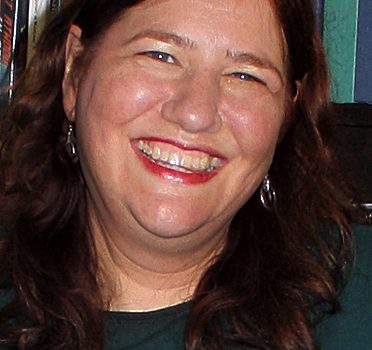2018 in Listening by Amy Goldschlager

Howdy, listeners! It’s been another year when audiobooks seem ever more robust as a medium, plus another year of the interminable online argument about whether listening to the audiobook has equal weight with reading the book (hint: yes, yes it does).
But, as is my wont at this time of year, I’m using this space to discuss the listening time I spent being unfaithful to audiobooks, and talk about the year in podcasts. In 2018, podcasts made a strong breakout into other media. The Night Vale network offered another podcast-based novel, this one an adjunct to the podcast Alice Isn’t Dead, about a trucker searching the weirder byways of America for her wife, caught up in a strange conspiracy. The true-crime podcast Dirty John was adapted for television and broadcast on Bravo; the more relevant-to-my-column Homecoming (a frightening technothriller in which a dangerous memory-erasing treatment is being administered both to recently repatriated soldiers and to staff who question the treatment) was streamed on Amazon Prime and nominated for three Golden Globes. I admit to not getting around to watching it yet, mostly because I’m cross that the role of the therapist, who was voice-acted by one of my fave actresses, the brilliant Catherine Keener, was replaced on the show. But I’m sure Julia Roberts was just fine.
 It was also a banner year for Limetown, the podcast about the deadly results of a technological experiment that grants people limited telepathy. The creators released a prequel novel and announced that the series is also being adapted for a Facebook Watch streaming video, with Jessica Biel named to play the first season’s protagonist, public radio reporter Lia Haddock. This fall, the producers also released the long-awaited season two of the podcast. Lia was kidnapped at the end of season one, and her fate unknown. In this season, Charlie, a brutally efficient fixer, has also been captured and imprisoned, while a mysterious interrogator questions her as to Lia’s whereabouts. In the process, we learn about another iteration of the telepathy experiment, with its own inevitably tragic results. This season was thrilling, chilling, and definitely open-ended enough to promise a season three.
It was also a banner year for Limetown, the podcast about the deadly results of a technological experiment that grants people limited telepathy. The creators released a prequel novel and announced that the series is also being adapted for a Facebook Watch streaming video, with Jessica Biel named to play the first season’s protagonist, public radio reporter Lia Haddock. This fall, the producers also released the long-awaited season two of the podcast. Lia was kidnapped at the end of season one, and her fate unknown. In this season, Charlie, a brutally efficient fixer, has also been captured and imprisoned, while a mysterious interrogator questions her as to Lia’s whereabouts. In the process, we learn about another iteration of the telepathy experiment, with its own inevitably tragic results. This season was thrilling, chilling, and definitely open-ended enough to promise a season three.
 We also had the Night Vale network’s third season of Within the Wires, an alternate-universe story told through found audio, exploring a world rebuilt after a Great Reckoning destroyed much of civilization in the 1930s. The chastened survivors, believing that war stemmed from personal affiliations, have attempted to eliminate the concept of nation and family through a world government and by raising children apart from their parents. This season consists of a set of dictaphone tapes from the early 1950s, composed by Michael Witten, a trans man voiced by Lee LeBreton, a nonbinary actor. Michael, Director of North American Trade, dictates both correspondence and instructions to his secretary, Amy Castillo, whose responses we never hear. Michael has grand plans for his part of the world, but they are being thwarted by Karen Rogers, a powerful industrialist who may be secretly building illegal militias and weapons caches. As the professional and personal threats against Michael increase, endangering him, his pregnant wife Vivi, and even their cat, he no longer knows whom to trust. Amy knows the most about him and his business – is she supporting him in this conflict or is she betraying him from within? This is a great series that manages to tell completely separate stories in different formats for each season, while still contributing pieces to a fascinating wider picture. It’s extremely thoughtful and well thought out: the best kind of speculative fiction.
We also had the Night Vale network’s third season of Within the Wires, an alternate-universe story told through found audio, exploring a world rebuilt after a Great Reckoning destroyed much of civilization in the 1930s. The chastened survivors, believing that war stemmed from personal affiliations, have attempted to eliminate the concept of nation and family through a world government and by raising children apart from their parents. This season consists of a set of dictaphone tapes from the early 1950s, composed by Michael Witten, a trans man voiced by Lee LeBreton, a nonbinary actor. Michael, Director of North American Trade, dictates both correspondence and instructions to his secretary, Amy Castillo, whose responses we never hear. Michael has grand plans for his part of the world, but they are being thwarted by Karen Rogers, a powerful industrialist who may be secretly building illegal militias and weapons caches. As the professional and personal threats against Michael increase, endangering him, his pregnant wife Vivi, and even their cat, he no longer knows whom to trust. Amy knows the most about him and his business – is she supporting him in this conflict or is she betraying him from within? This is a great series that manages to tell completely separate stories in different formats for each season, while still contributing pieces to a fascinating wider picture. It’s extremely thoughtful and well thought out: the best kind of speculative fiction.
 On the more comic side, Maximum Fun network introduced Bubble, a sci-fi sitcom pitched as “Buffy meets Portlandia,” which it pretty much is. Fairhaven is a city of coffee, book clubs, hipsters, and smug bougie couples, enclosed in a dome that protects it from the wastelands outside, which are populated by the mutant creatures called imps and roving bands of feral human hunter-scavengers. As a child, Morgan was one of these scavengers. Now she lives in Fairhaven and works for the corporation that runs the city and took her in; specifically, when summoned by an Uber-like app, she hunts down the stray imps that periodically get inside. She also has a roommate who manufactures drugs from imp blood, an ex-boyfriend for whom she clearly still has feelings, an awkward, nerdy friend new to imp-hunting, and, most embarrassing of all, a father who still lives outside with dreams of conquest. The individual stories and jokes are somewhat contrived, but it’s a gently amusing sendup of gentrification that is reasonably enjoyable. I’ll probably sign on for another season, just to see where the cliffhanger at the end of season one leads us.
On the more comic side, Maximum Fun network introduced Bubble, a sci-fi sitcom pitched as “Buffy meets Portlandia,” which it pretty much is. Fairhaven is a city of coffee, book clubs, hipsters, and smug bougie couples, enclosed in a dome that protects it from the wastelands outside, which are populated by the mutant creatures called imps and roving bands of feral human hunter-scavengers. As a child, Morgan was one of these scavengers. Now she lives in Fairhaven and works for the corporation that runs the city and took her in; specifically, when summoned by an Uber-like app, she hunts down the stray imps that periodically get inside. She also has a roommate who manufactures drugs from imp blood, an ex-boyfriend for whom she clearly still has feelings, an awkward, nerdy friend new to imp-hunting, and, most embarrassing of all, a father who still lives outside with dreams of conquest. The individual stories and jokes are somewhat contrived, but it’s a gently amusing sendup of gentrification that is reasonably enjoyable. I’ll probably sign on for another season, just to see where the cliffhanger at the end of season one leads us.
I keep meaning to devote listening time to SF anthology podcasts; I hear good things about StarShipSofa and the podcasts associated with Lightspeed and Beneath Ceaseless Skies. I managed to sneak in one such podcast that has considerable local interest for me. Kaleidocast, produced by the Brooklyn Speculative Fiction Writers, has actors narrate stories from several writers prominent in the New York City literary scene and familiar to me personally; through this series, I hope these authors will become familiar to more of you, too. I dipped into the second season, which began in the summer of 2018.
I confess that I find the podcast’s framing device, involving story hunters in a fractured Brooklyn-based multiverse, somewhat silly, but it’s pretty easy to slide by it to the real meat, the stories themselves, which include contributions by Nancy Hightower, Phenderson Djèlí Clark, and Mike Allen. I particularly enjoyed Mercutio D. Rivera’s “The Water Walls of Enceladus”, which employs a contractual relationship between an alien race and a human woman with a disfiguring disease to intelligently and uncomfortably explore the downside of attracting both positive and negative attention for one’s looks, and Essowe Tchaim’s great piece of world-building in “Emperor Mantis”, a vivid depiction of a society of human-insect hybrids in rebellion.
This season also includes the 2016 Nebula nominee “Sabbath Wine”, which I have heard the author, Barbara Krasnoff, read twice, and it has reduced me to a weepy puddle each time. It concerns the friendship between a little Jewish girl and an African-American boy, a quest to find kosher wine during Prohibition, and the desperately sad link between the children’s fathers.
Finally, for a deep dive into the creative process behind various pieces of media in the SF genre, I recommend Imaginary Worlds from journalist Eric Molinsky, who puts all of the considerable experience he gained in public radio to bear to discuss key motifs in books, television, films, and gaming. He also very kindly gave a talk about the podcast this summer, and I learned a great deal about the process of editing audio to gain a clean sound, and how to turn an interview full of vocal stumbles into a coherent narrative.
Too many great things to listen to, and not enough time. I’ll be back in April with more thoughts on recent audiobooks. Happy 2019, and keep those earbuds busy!
This and more like it in the February 2019 issue of Locus.
 While you are here, please take a moment to support Locus with a one-time or recurring donation. We rely on reader donations to keep the magazine and site going, and would like to keep the site paywall free, but WE NEED YOUR FINANCIAL SUPPORT to continue quality coverage of the science fiction and fantasy field.
While you are here, please take a moment to support Locus with a one-time or recurring donation. We rely on reader donations to keep the magazine and site going, and would like to keep the site paywall free, but WE NEED YOUR FINANCIAL SUPPORT to continue quality coverage of the science fiction and fantasy field.








